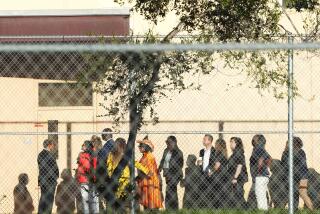Accused Pleads Guilty to Killing 5 Florida Students : Crime: Lawyer says Danny Rolling wants to spare families a public airing of gruesome details. A jury will decide if he is to die in the electric chair.
MIAMI — Louisiana drifter Danny Harold Rolling surprised a Gainesville courtroom by pleading guilty Tuesday to the 1990 mutilation murders of five college students, heralding the end of one of the most wrenching chapters in Florida criminal history.
“I’ve been running from first one thing and then another all my life, whether from problems at home, or with the law, or from myself,” Rolling, 39, told the court just before jury selection for his murder trial was to begin. “But there are some things that you just can’t run from, and this being one of those.”
Circuit Judge Stan R. Morris accepted Rolling’s guilty pleas to five counts of murder and three counts each of sexual battery and armed burglary in the serial killings that traumatized Gainesville just as the fall term at the University of Florida got underway 3 1/2 years ago.
Rolling has been in custody since Sept. 7, 1990, about a week after the last of the bodies was discovered, when he was arrested for a supermarket robbery in Ocala. But more than a year went by before DNA evidence taken from blood and semen samples at the murder scenes linked him to the crimes, and during that time the north Florida college town was haunted by the grisly slayings.
Although the pleading answered the question of guilt, a jury will be chosen beginning today to decide if Rolling is to die in Florida’s electric chair. He has already been sentenced to three life terms in prison as an armed robber and career criminal.
Attorney Rick Parker, Rolling’s public defender, said his client decided three weeks ago to plead guilty to spare the families of his victims a public airing of the gruesome details of the murders. “He thinks it is the right thing to do,” Parker said.
Still, the jury picked to recommend Rolling’s sentence is likely to hear more than they wish about the brutal killings of the four women and one man. One of the female victims was decapitated, three were raped and all were stabbed several times. The bodies of the four women were also posed, investigators said, to shock whoever discovered them.
Parker said that although Rolling was competent to enter the guilty pleas, “he is and has been since before these crimes mentally ill.”
Testimony from experts about Rolling’s mental state, Parker said, “will be helpful in understanding how the same person can rape and murder then later regret these acts and feel compassion for the living loved ones surviving his violence.”
Relatives of the victims, many of whom were in the courtroom Tuesday, found that hard to take. “I have no pity for this individual,” said Mario Taboada, whose brother, Manuel, died at Rolling’s hands. “This is a life form gone bad.”
Many students at Florida’s largest state university, most of whom were not on campus when the killings occurred, expressed relief that they would not have to relive the horror.
Added university President John Lombardi: “On the one hand, we’re delighted there is clear closure as to the question of guilt. But on the other, nobody will have closure to the pain, to the loss, the scar it leaves on your soul.”
Prosecutor Rod Smith said no deals were made with Rolling in exchange for his guilty pleas, and he vowed to seek the death penalty. “We now know who is the slayer of the students in Gainesville,” Smith said.
Parker said Rolling will fight to avoid execution, and wants to testify during the upcoming penalty phase.
The case against Rolling, which included DNA evidence as well as statements from a cellmate, was constructed by a multi-agency task force that employed more than 200 investigators and spent more than $5 million. Some 148 witnesses were scheduled to testify at the trial, which was expected to last up to 10 weeks.
The nightmare in Gainesville began on Aug. 26, 1990, when the bodies of University of Florida students Christina Powell, 17, and Sonja Larson, 18, were found in the off-campus apartment they shared. Powell had been raped, and both had been stabbed to death.
The following day, Christa Hoyt, an 18-year-old student at Santa Fe Community College, failed to show up for work as a records clerk in the Sheriff’s Department. Police checking her apartment found her dead of multiple stab wounds. She also had been beheaded.
As hundreds of students left town, and hundreds more bought firearms and chemical Mace for protection, two more bodies were found the next day, Aug. 28. University of Florida pre-law student Tracy Paules and Santa Fe student Manuel Taboada, both 23, longtime friends from Miami, were found dead in their apartment. Surprised as they slept, they too had been repeatedly stabbed.
Rolling, who once shot his father, a retired police officer, in the face during an argument, is also a suspect in a triple murder in his hometown of Shreveport, La. Police there point to detailed similarities between the Gainesville slayings and the November, 1989, stabbing deaths of college student Julie Grissom, her father and an 8-year-old nephew.
But Caddo Parish Dist. Atty. Paul Carmouche said Tuesday that authorities still lacked enough evidence to charge Rolling. “If he’s in a confession mode and wants to talk about Shreveport, the Shreveport police are on call,” Carmouche said.
More to Read
Sign up for Essential California
The most important California stories and recommendations in your inbox every morning.
You may occasionally receive promotional content from the Los Angeles Times.









